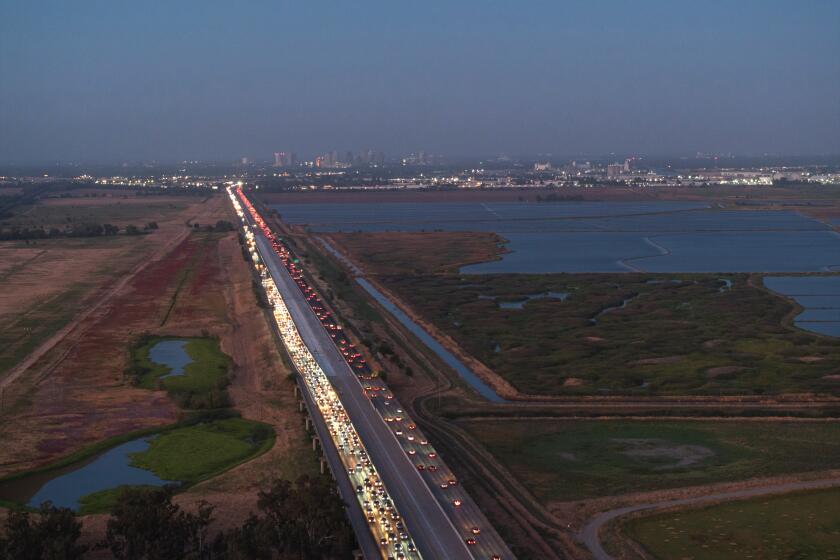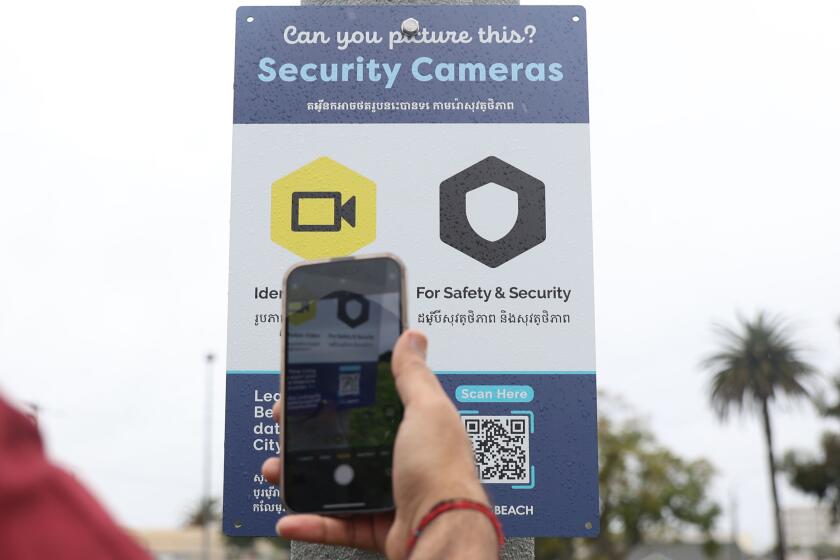Are automated license plate readers in your city? Here’s how to find out

- Share via
Will Freeman wants people to know they’re being tracked.
His desire to shed light on the proliferation of license plate readers in his neighborhood in Huntsville, Ala., this year spurred an idea for a crowdsourced database where people across the world can upload the locations of the readers. The database, called DeFlock, also provides users with the option to list who manufactured the cameras for greater transparency.
“Everything you see on there is just a very small percentage of what actually exists,” Freeman said of the thousands of cameras listed on his project.
Over the past decade, license plate readers have become a useful tool for law enforcement agencies across the country. But privacy advocates have raised alarms about the technology, alleging that the cameras track people without their consent and that the data stored on them can be vulnerable to bad actors.
Freeman has about 20,000 pending data points he plans to add to the global map. DeFlock, first reported by 404 Media, arrives as more local governments and even private homeowners turn to surveillance technology to combat crime.
The sheriff’s and police departments shared license plate information and perhaps even more sensitive materials with out-of-state agencies, against state privacy protocols, Sacramento County’s grand jury says.
Freeman’s idea for greater technological transparency started with a handful of waterproof pages he posted around his Alabama neighborhood.
“The pages said ‘license plate reader’ with an arrow pointing up,” Freeman said. “They were all taken down in a matter of days.”
Undeterred, Freeman did what any software engineer would do when faced with such a roadblock: He took it online. “There are people who defend their existence, but I don’t think it’s worth it,” he said of the license plate readers.
In Riverside County, more than 1,600 automated license plate readers dot intersections and roads. The cameras detect millions of vehicles over a 30-day period and are meant to help police search for stolen vehicles or assist in other investigations. License plate readers are also located in San Francisco, Los Angeles, Houston, Chicago, Boston and other major cities.
Riverside County contracted with Flock Security to establish its network of license plate readers. The county’s public-facing transparency portal provides a snapshot of the system. Los Angeles installed approximately 100 license plate readers in the San Fernando Valley in October for about $500,000 in the hope of addressing crime. The license plate readers are manufactured by Motorola Solutions and, like most others, can detect a vehicle’s make, model and color, while recording the GPS location, date and time.
The camera alerts police if it captures a reported stolen vehicle, but there’s also a voluminous amount of data stored by police agencies of all the other cars on the road. Critics argue the data can fall into the wrong hands or be abused.
“We’ve seen law enforcement officers themselves use the data for their own purposes,” said Electronic Frontier Foundation Director of Investigations Dave Maass. “It should be frightening to everybody, because where we go in our lives is not the government’s business.”
The cameras will be at or near intersections in Chatsworth, Northridge, Granada Hills, Sherwood Forest, Porter Ranch, West Hills and North Hills.
A 2020 California audit noted that the Los Angeles Police Department, Fresno Police Department, Marin County Sheriff’s Office and the Sacramento County Sheriff’s Department improperly stored images of vehicles that were not part of a police investigation.
A police officer could in theory track where a person goes without requiring a search warrant or subpoena through the data collected by automated license plate readers, Maass said.
In 2022, the Wichita Police Department in Kansas was forced to revoke access to its network of license plate readers after a police lieutenant allegedly used the system to stalk his estranged wife, according to reporting from news station KWCH.
California law dictates how long data are stored and how they are shared by law enforcement agencies. Unless it’s used in a criminal investigation, information captured by a license plate reader is not stored with any personally identifiable information, said Sgt. David Chi of the L.A. County Sheriff’s Department.
Last year, the California state auditor found that only a few law enforcement agencies that use license plate readers have privacy policies in place.
Los Angeles County sheriff’s officials have relied on license plate readers more frequently as the technology has improved.
“We call it ‘catch them now or catch them later,’” Chi said, referring to how the technology can be used. A camera might alert police the moment it registers the vehicle of a person wanted as part of an investigation or authorities might pore over captured images as part of a case, he said.
Long Beach’s digital rights platform consists of data privacy notices for about 20 unique city-deployed technologies that collect personally identifiable information.
But privacy advocates worry that the cameras could be used by police or others with access to surveillance networks to track a person for non-criminal activity.
That could be someone going to a clinic for abortion access or maybe a political rally, said Jake Laperruque, deputy director of the Security and Surveillance Project at the Center for Democracy and Technology.
The use of the cameras has already extended outside police departments.
A Southern California homeowners association pooled its resources and welcomed the installation of license plate readers in its neighborhood to deter crime.
“It’s the type of thing where there’s a lot of power to pull up information about what people are doing, where they’re going, who they’re interacting with, and very little to stop how the government uses that,” Laperruque said.














